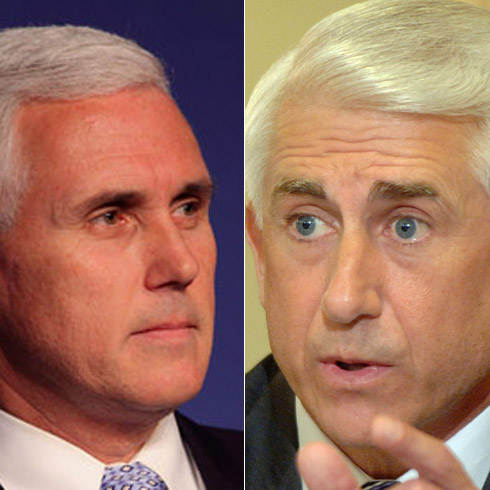Rep. Mike Pence (R-IN) and Rep. Dave Reichert (R-WA) briefed reporters this afternoon on the House GOP’s plans for health care this week. The party will focus on reform’s effects on senior citizens, specifically through changes to Medicare. Democratic proposals include several changes to the way Medicare is funded that have long had support from the AARP, far and away the most powerful lobbying group for seniors. But Pence and Reichert suggested that support was the result of corruption inside the AARP and not based on the interests of its membership.
“What you’ve got here is a backroom deal,” Pence said of reform measures expected to be introduced by Senate Majority Leader Harry Reid this afternoon. “Democrats are protecting the salaries of the heads of groups like AARP while cutting medicare.”
For its part, AARP dismisses the allegations, pointing out that it has seen this movie before.
“How can AARP support a half-a-trillion dollar cut to the Medicare/Medicaid system?” Reichert asked. He said that the cuts include more than $100 billion in cuts to Medicare Advantage, a program which allows Medicare recipients to receive their benefits through private insurance companies like HMOs. Reichert claims that cuts in the program would mean reduced benefits for seniors, requiring more of them to buy Medigap insurance, private health coverage that picks up health payments after Medicare’s payment schedules are met.
AARP offers Medicare Advantage, Medigap and Medicare Part D prescription drug insurance through United Health, one of the nation’s largest for-profit health plans. Reichert and Pence said that relationship troubled them when it comes to AARP’s support for reform to the Medicare payment system.
“Sixty percent of AARP’s revenues come from Medigap, where it acts as middleman to United Health,” he said. “If you cut Medicare Advantage, you will move customers to Medigap.”
“What’s the definition of an insurance company?” Reichert asked, pointing at the AARP’s various branded insurance products.
“Unfortunately it comes with the territory,” said David Certner, legislative policy director for AARP when asked about the GOP claims today. Certner said he’s seen the conflict of interest allegations before, from both sides of the aisle.
In 2003, AARP backed the controversial Medicare Part D prescription program over the objections of many Democrats. “We were vilified by the left,” Certner said. Then, a couple of years later, when the group was publicly opposed to President Bush’s plan to privatize social security, Certner said “we were vilified by the right.”
Certner said the millions the group earns in insurance royalties annually do not affect its lobbying focus. “We’re looking out for what our members care about,” he said.
Pence and Reichert went further than the conflict of interest allegations though, suggesting there was a direct quid pro quo behind AARP’s support for the Medicare reforms. Versions of the bill discussed in the Senate have included calls for health insurance company executive pay to be limited to $500,000 per year, part of a plan proponents say will keep insurance companies from gleaning undo profit from the millions of new customers reform will bring them. AARP, which is not an insurance company, would not be subject to the suggested pay caps, and Reichert suggested that was another reason the AARP might be backing the cuts.
Certner seemed frustrated by the allegation.
“I’m trying to find the specific word here,” he said when asked about the claim. Finally he said, “that charge is not an accurate charge.”









